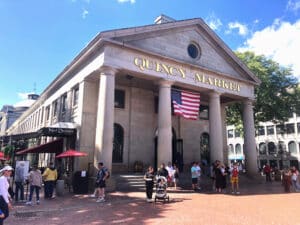
Boston officials are pressing the new owner of Faneuil Hall Marketplace for additional oversight on their leasing and capital improvements strategies. Photo by Steve Adams | Banker & Tradesman Staff
Since new owners acquired Faneuil Hall Marketplace in January, there have been few obvious signs of change at one of Boston’s most instantly recognizable landmarks.
Behind the scenes, city officials have been in discussions with new leaseholder J. Safra Real Estate to address complaints from a civil rights group that the property underrepresents minority- and women-owned businesses.
J. Safra’s acquisition of the ground lease has set in motion fresh discussions on sore points plaguing the city-owned property, from dilution of its local flavor to deferred maintenance and unimaginative leasing strategies.
“The tourists come because it’s a must-do when you visit Boston,” said Whitney Gallivan, a partner and managing director at Boston Realty Advisors. “I can’t say if they are satisfied when they visit. I assure you the locals are not satisfied and have no reason to visit.”
Architect Hired, Lease Amendment Sought
After the acquisition, J. Safra began working with Boston-based Elkus Manfredi Architects on a visioning plan for the 209,000-square-foot premises, which includes the Quincy Market building containing a food colonnade and rotunda, and the North and South Market buildings. It’s also had discussions with a New York placemaking firm about hosting an exhibit in the rotunda as part of Boston’s emerging plans for a 250th anniversary of the American Revolution.
The changes are discussed in emails between Boston Planning & Development Agency officials, J. Safra Real Estate and other parties obtained by Banker & Tradesman under a public records request.
Elkus Manfredi and Local Projects did not respond to requests for comment.
A proposed lease amendment submitted by the BPDA to J. Safra in April would extend the lease from its current 2074 expiration through 2123. It requires J. Safra to submit a tenanting strategy every five years, subject to approval by the city.
The requirement appears to respond to Boston-based Lawyers for Civil Rights, which issued a letter to J. Safra in February with a series of requests for changes in how the marketplace recruits and selects tenants.
Lawyers for Civil Rights requested J. Safra reach a goal of 40 percent locally owned tenants by the end of 2024, and 60 percent women- or minority-owned businesses throughout the marketplace.
Roz Freeman, the entrepreneurship manager at Lawyers for Civil Rights, criticized Faneuil Hall Marketplace for lack of transparency in its leasing strategy. In the letter, Freeman asked the new owners to post all space available for lease online, host public events with potential tenants and partner with community organizations such as the Black Economic Council of Massachusetts to diversify the tenant mix.
As of February, the marketplace’s tenants included 34 percent locally-owned businesses, 23 percent women-owned businesses and 24-percent minority-owned businesses, according to the letter. Freeman did not respond to messages seeking additional comment.
BPDA officials declined an interview to discuss the future of the property.
“We want the property to be a showcase of Boston, and for our new partner to invest in the future of the Marketplace with a comprehensive vision for how to make it more authentic to the city we know and love by choosing local tenants that represent Boston’s diversity and culture,” the BPDA said in a statement this week.
The property also is subject to a payment in lieu of taxes (PILOT) agreement based upon annual revenues. The current payment was not available from the BPDA, but the PILOT payment totaled approximately $4 million in 2020 when former leaseholder Ashkenazy Acquisition Corp. fell behind on its payments during the COVID shutdown.
Wholesale Changes Coincided with Bicentennial
A pet project of former Mayor Kevin White during the 1970s, Faneuil Hall Marketplace’s opening coincided with Boston’s rising tourism profile as America’s Bicentennial approached.
The Rouse Co. signed the ground lease in 1975 to convert the former wholesale food stalls into a festival-style marketplace featuring a food colonnade and locally-owned shops hawking Colonial-era inspired goods amid an environment enlivened with street performers and pushcart vendors.
The Maryland developer agreed to pay $200 million to complete the building renovations, while inking a ground lease paying $10 a year. An exhibit in the Quincy Market rotunda blended Boston’s Colonial history and emerging technology industry, according to a Boston Globe account at the time.

A vacant storefront in the South Market building at Faneuil Hall Marketplace in Boston. Photo by Steve Adams | Banker & Tradesman Staff
By the time that New York-based Ashkenazy Acquisition Corp. acquired the lease in 2011, critiques of the property ranged from the shift toward chain retailers to a lack of destination attractions for locals.
Ashkenazy demolished the long-time flower shop structure in 2016 for a new Sephora store and lured Japanese apparel chain Uniqlo in 2016. The Cheers bar replica closed in the midst of the pandemic in 2020 after 20 years, and its space remains vacant. In 2023, a Margaritaville restaurant opened in the former McCormick & Schmick’s restaurant space.
Today, vacant storefronts fill a significant section of the South Market building.
Food and Beverage for Foot Traffic
Real estate brokers say the new owners have an opportunity to reverse the failed strategies of the previous ownership and enable the property to compete with freshly minted shopping destinations such as the Seaport District.
“The market demand has dwindled with other pockets of retail coming up and really becoming viable elsewhere in the city,” said Ann Ehrhart, founder and CEO of Boston-based retail advisory firm Everstreet. “What’s going on downtown with some of the struggles of getting offices back to 100 percent, I don’t think that’s helping.”
While office vacancies and remote work have drained foot traffic from the downtown area in recent years, Faneuil Hall has some new neighbors that have added thousands of office workers and residents to the neighborhood. The 1 million-square-foot One Congress office tower is fully leased and hundreds of residents populate the 45-story Sudbury residential tower, both of which are a five-minute walk from the marketplace.

Steve Adams
“Everything starts with food and beverage and foot traffic,” Boston Realty Advisors’ Gallivan said. “Get some good restaurant operators and fast casual, layer in some fitness operators, and load it up with reasons to visit. There is a population around there, and people are eating out again and having work lunches and going out for drinks. For the right concepts and right operators, people are going to them.”
But the new landlords also have to contend with hurdles ranging from the age of the structures, deferred maintenance and newly-enacted historic regulations.
In April, the Boston Landmarks Commission added the North and South Market buildings to its inventory of protected landmarks. The decision gives the panel review and approval power over a wide range of physical changes to the 1820s structures.
The buildings also contain upstairs office space, some of which would have been converted into a 180-room hotel under preliminary plans floated by Ashkenazy in 2015 but never formally proposed.
A spokesperson for J. Safra Group declined to comment on the company’s plans for the property or to respond to the requests from Lawyers for Civil Rights.





